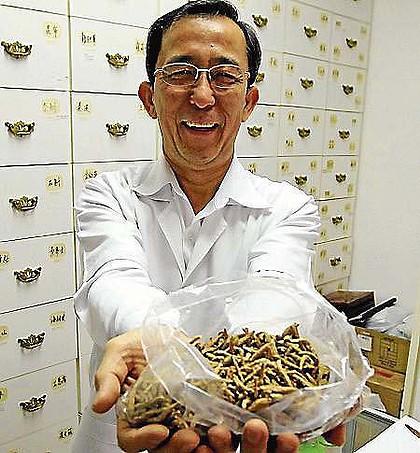
Traditional ... Professor Hoc Ku Huynh with ingredients for herbal medicines. Photo: Peter Rae
A TIBETAN fungus that feeds on the corpse of the caterpillar host it invades has become the latest victim of speculation on the Chinese market.
And it has not taken long for the phenomenon to hit the hip pockets of Sydney's purveyors of Chinese medicine.
Known as cordyceps sinensis, yartsa gunbu, caterpillar fungus and Himalayan viagra, the prized dried mushroom, hailed by the Chinese for its anti-tumour, anti-fungal and anti-viral properties, has become prohibitive in price.
The fungus wholesales at $HK5000 for 37 grams - almost $18,000 a kilogram - too expensive for Hoc Ku Huynh to stock in his Haymarket practice any more. Even the lower-grade processed tablet form of the mushroom has risen, costing about $100 for a 20-day supply.
At the more exotic end of the market, caterpillar fungus is not the only medicinal herb worth almost its weight in gold due to a host of economic, geographical and health shifts on the Chinese mainland in the past 12 months.
Professor Huynh says the price of tai zi shen (pseudostellaria root), used to treat low fever and fatigue has risen between 200 and 300 per cent in the past 12 months, to about $150 a kilogram. Chinese angelica, used for gynaecological complaints, has also risen by 200 percent.
Gary Wu, the manager of the herbal wholesaler Winner Trading, in Melbourne, said the price of Chinese medicinal herbs had been undervalued over a long period. But a combination of natural disasters such as an eight-month drought followed by flooding and earthquakes, a rise in Chinese labour costs and a clampdown by the Chinese government on property speculation, prompting investors to sink their money into more exotic projects, had conspired to force up prices dramatically in Australia, notwithstanding the strong local dollar.
''The price increase has affected the Australian market, but smart Chinese medicine practitioners would use alternative herbs or methods to offset the increase,'' Mr Wu said. ''Just bear in mind that Chinese herbal medicine is still reasonably cheap compared with other alternatives.''
However, Wade James, a practitioner in Perth and a board member of the Australian Acupuncture and Chinese Medicine Association, said there was strong evidence suggesting that middlemen in Hong Kong, Taiwan and Japan had been stockpiling medicinal herbs.
The practice had forced up the price of some stocks five-fold, Mr James said, coinciding with a sudden sharp increase in demand for traditional therapies from China's growing middle-class after bird and swine flu scares.





